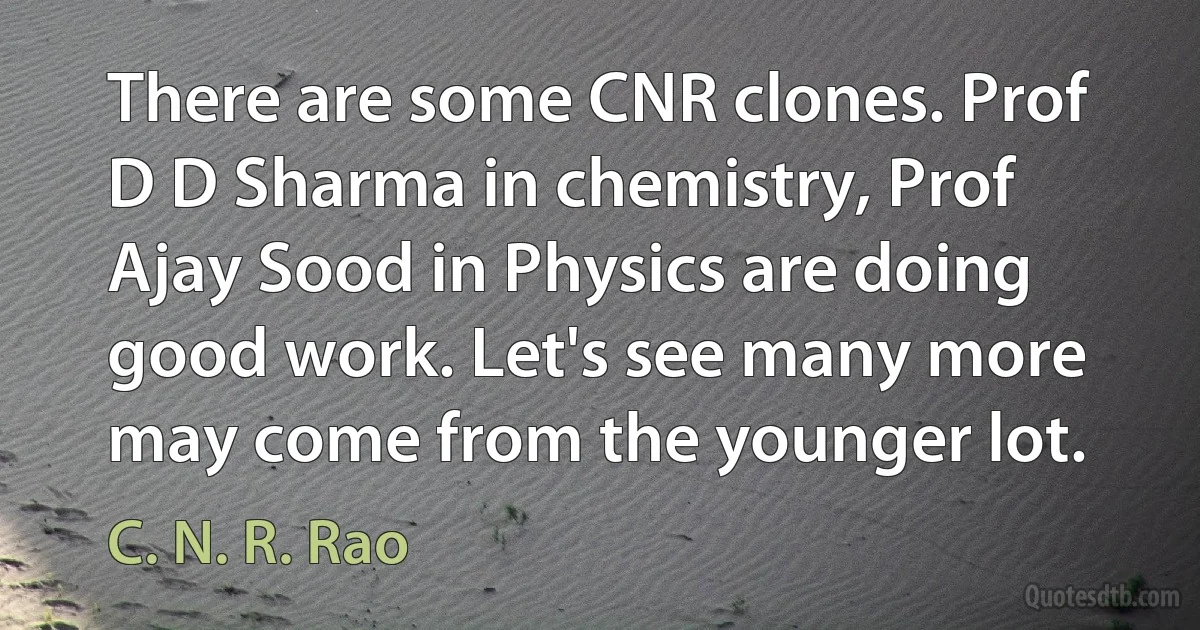Chemistry Quotes - page 9
Classical science in its diverse disciplines, be it chemistry, biology, psychology or the social sciences, tried to isolate the elements of the observed universe - chemical compounds and enzymes, cells, elementary sensations, freely competing individuals, what not -- expecting that, by putting them together again, conceptually or experimentally, the whole or system - cell, mind, society - would result and be intelligible. Now we have learned that for an understanding not only the elements but their interrelations as well are required: say, the interplay of enzymes in a cell, of many mental processes conscious and unconscious, the structure and dynamics of social systems and the like.

Ludwig von Bertalanffy
I'll say, what makes me happy about making movies is, every once in a while through movies we find a kind of honesty. There's an honesty in fiction that's as effective or even more powerful than the honesty of our lives. We can find something that's genuinely true, like a chemistry between people or a statement that speaks to an audience.

Shane Black
Part of the charm of synthetic organic chemistry derives from the vastness of the intellectual landscape along several dimensions. First, there is the almost infinite variety and number of possible target structures that lurk in the darkness waiting to be made. Then, there is the vast body of organic reactions that serve to transform one substance into another, now so large in number as to be beyond credibility to a non-chemist. There is the staggering range of reagents, reaction conditions, catalysts, elements, and techniques that must be mobilized in order to tame these reactions for synthetic purposes. Finally, it seems that new information is being added to that landscape at a rate that exceeds the ability of a normal person to keep up with it. In such a troubled setting any author, or group of authors, must be regarded as heroic if through their efforts, the task of the synthetic chemist is eased.

Elias James Corey
Laplace made many important discoveries in mathematical physics... Indeed, he was interested in anything that helped to interpret nature. He worked on hydrodynamics, the wave propagation of sound, and the tides. In the field of chemistry, his work on the liquid state of matter is classic. His studies of the tension in the surface layer of water, which accounts for the rise of liquids inside a capillary tube, and of the cohesive forces in liquids, are fundamental. Laplace and Lavoisier designed an ice calorimeter (1784) to measure heat and measured the specific heat of numerous substances; heat, to them, was still a special kind of matter. Most of Laplace's life was, however, devoted to celestial mechanics.

Morris Kline
Mental states such as loneliness, compulsion, anguish, attachment, pain, and faith are not just "all in the head" but in the brain as well. Brain, mind, and body are a continuum. Our thoughts-intention, fear, images, suggestion, expectation- alter the brain's chemistry. And it works both ways; thoughts can be altered by changing the brain's chemistry with drugs, nutrients, oxygen. The brain is hopelessly complex.

Marilyn Ferguson
Since I set up the Unit, the area of solid state chemistry is no longer called so but is called chemistry of materials. This subject has become important. I set up this Unit in Bangalore much before the subject became important in the world. Now chemistry has two major directions:chemical biology and materials chemistry.

C. N. R. Rao
University of California at Berkeley (UC Berkeley) is one of the most outstanding universities, and the Chemistry Department there ranks first amongst the universities of the world in research performance. This department was established by G. N. Lewis, who is considered to be the father of modern chemistry.

C. N. R. Rao
I have been working in the area of solid state chemistry for nearly four decades. When I first got seriously interested in the subject in the early 1950s it was still in in infancy. Very few chemists, let alone others, recognized solid state chemistry as an integral part of the main-stream chemistry. In spite of such benign tolerance, solid state chemistry has gradually emerged to become a crucial component of modern solid state and material science.

C. N. R. Rao



